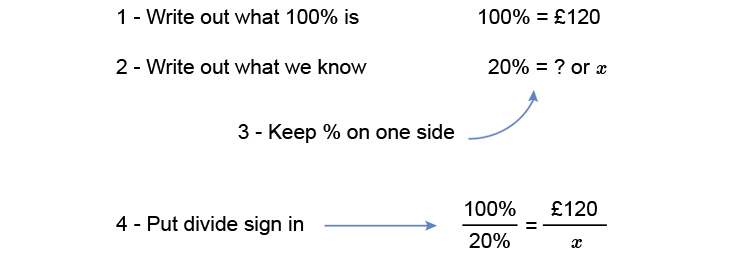General exam questions
Example 1
A baby’s weight increases by `7%` over a month from birth to `3.9kg`. What was the baby’s weight at birth?

NOTE:
A `7%` increase on `100%` is `107%`

Multiply both sides by `3.9` to get `x` on its own (remember - what you do to one side you do to the other).
`(100times3.9)/107=(xtimescancel3.9)/cancel3.9`
`(100times3.9)/107=x`
`x=(100times3.9)/107`
`x=3.64`
Answer: The baby’s weight at birth was `3.64kg`
Example 2
John buys a drill for `£150.00` inc sales tax and James buys the same drill using a trade account for `£120.00` exc sales tax. If sales tax is charged at `20%` how much tax did John and James pay and who paid the least in total for the drill?
First work out what James paid.

Multiply both sides by `x` to get `x` on its own
`(100timesx)/20=(120timescancelx)/cancelx`
`(100x)/20=120`
Multiply both sides by `20` to get `x` on its own
`(100xtimescancel20)/cancel20=120times20`
`100x=120times20`
Divide both sides by `100` to get `x` on its own
`(cancel100x)/cancel100=(120times20)/100`
`x=(120times20)/100`
`x=(24cancel00)/(1cancel00)`
`x=24`
James paid `£24.00` tax on his drill and a total of `£120.00 + £24.00 = £144.00`
Now lets work out what John paid.

NOTE:
`£150.00` is including the `20%` sales tax so is equal to `120%`?

Multiply both sides by `150.00` to get `x` on its own
`(100times150)/120=(xtimescancel150)/cancel150`
`(100times150)/120=x`
`x=(100times150)/120`
`x=125`
John paid `£125.00` excluding sales tax for his drill, so the sales tax he paid was:
`£150.00 - £125.00 = £25.00`
Answer: John paid `£25.00` sales tax on his drill and `£150.00` in total
James paid `£24.00` in sales tax on his drill and `£144.00` in total
So James paid less for his drill.




